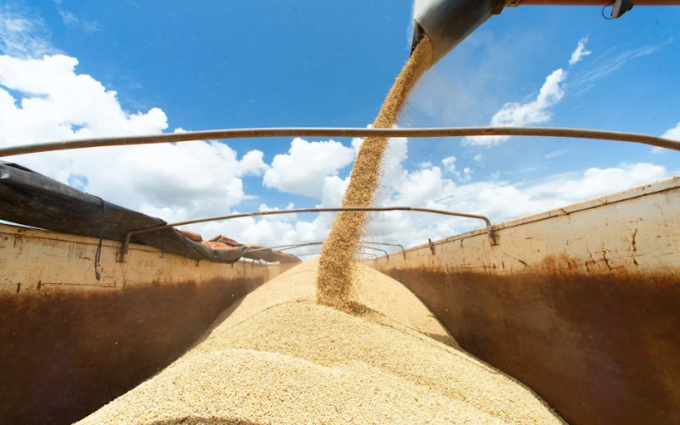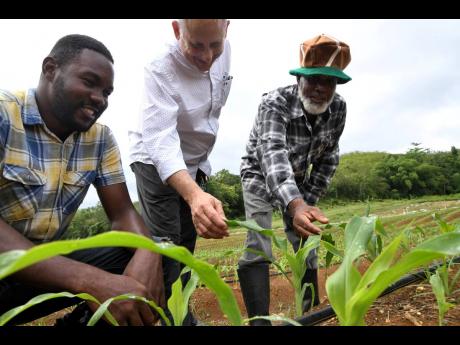November 27, 2025 | 22:04 GMT +7
November 27, 2025 | 22:04 GMT +7
Hotline: 0913.378.918
November 27, 2025 | 22:04 GMT +7
Hotline: 0913.378.918

The cost to export soybeans this season has exceeded Cargill’s estimates for freight rates by at least 25%, slashing margins, according to Paulo Sousa, who heads Cargill’s operations in the South American nation. Photo: Bloomberg
That’s according to Cargill Inc., one of the biggest global shippers of the oilseed. Diesel price hikes and worsening road conditions have led to expensive freight rates. The cost to export soybeans this season has exceeded Cargill’s estimates for freight rates by at least 25%, slashing margins, according to Paulo Sousa, who heads Cargill’s operations in the South American nation.
“Logistics were very complicated for Brazil’s summer crop,” Sousa said in a telephone interview. “Who could’ve forecast oil prices at current levels?”
Spiking fuel costs in one of the world’s biggest crop exporters are in focus, because they threaten to further accelerate food inflation that’s gripping the globe. Transportation is already one of the biggest costs in getting crops out of fields to their ultimate destinations, which in the case of soy could be a livestock feeding operation or a food processing plant.
In Brazil, more than half of grain and oilseed production is carried from farms to ports via trucks, and fuel prices largely determine freight rates. Also, a big difference between estimates and the real cost of freight can lead to significant losses for traders like Cargill, because companies usually discount freight costs when they pay farmers, often months before harvest.
One bright spot is that soybean crushing margins are “excellent” amid strong demand for soybean oil, Sousa said. Also, Cargill isn’t expecting any shrinkage in soybean acres even as costs of fertilizer soar, because it’s still profitable to cultivate the oilseed. While farmers may use less fertilizer, it’s too early to estimate yield losses from that, Sousa said.
Corn could also bring more profits for exporters in Brazil. Demand is expected to soar in the coming months amid declining supplies from the Black Sea due to the war between Russia and Ukraine, two important producers.
Other takeaways from the interview include:
A stronger real is adding to the difficulties for exports created by higher transportation costs, Sousa said.
Soybean export volumes are being hurt by falling production due to adverse weather from La Nina patterns.
Cargill hasn’t seen disruptions to its imports of fertilizers so far.
Farmer seeks to revolutionise agricultural practices

Hartland Stoddart (right), production manager of Dyermark Preservation Farm, and Tavoy Thompson (left), farm manager, show sweet corn trees to JMEA President John Mahfood during a tour of the farm in Clarks Town District, Bog Walk, St Catherine, on Friday. Photo: Gleaner
Dyermark Preservation Farms, born out of interest by its owner Lansford Dyer in emerging agricultural practices such as regenerative agriculture and sustainable intensification, is trying to revolutionise agricultural practices with a focus on producing organic foods and providing employment.
On a recent tour of the 20-acre Bog Walk farm with Jamaica Manufacturers and Exporters Association (JMEA) President John Mahfood, who sought to get an update on the progress of Dyermark Preservations Farms, Dyer outlined the genesis of the enterprise and his long-term plans for sustainability.
“We want to create an off-road multicrop form grounded in the principles of sustainable intensification and perm culture and positioned for vertical and horizontal integration,” Dyer said.
According Dyer, he is faced with the difficulty of accessing loans from the Development Bank of Jamaica and other facilities despite recent participation in the Jamaica Business Development Corporation International Labour Organization-sponsored formalising operations in the Jamaica Agricultural and Fisheries sector project.
“Some of the assistance needed is financing for a complete packaging house to secure an export licence, purchasing of various input materials, refrigerated box truck, a backstop for liquidity shortfall, and the rehabilitation of workers’ living quarters,” Dyer emphasised.
To this end, Dyer intends to collaborate on a pilot project in the areas of sustainable intensification and environmental preservation by establishing a model corporation using recycled plastic containers for growing vegetables, in addition to acreages of sweet corn, ginger, spices, ground provisions, production of honey, orchard crops, poultry and fish farming, sauces, herbs teas, nutraceuticals, and oils.
Yet another difficulty Dyer faces in achieving this is the collaboration with non-governmental organisations and the universities to establish a pilot project in the areas of sustainable intensification and environmental preservation.
Mahfood, while acknowledging Dyermark Preservation Farms as a promising entity, said it is in the early stages of the development but on the right trajectory with a certain amount of acreage of pepper and sweet corn.
“He has equipment in terms of backhoe and tractors, he has electricity in terms of solar, and he has water, and he has in place his management team, so he has in place the basics to produce more on the farm,” he JMEA president said.
Mahfood said his focus on ginger, ackee, and coconut oil are all good for the local and international markets while referencing the shortage of ackee on the international market.
He said the JMEA will be meeting with the DBJ to see how best the issue of financing for small farmers, a problem consistent with other farmers, can be addressed.
(Bloomberg; Gleaner)

(VAN) A new study reveals how the simultaneous effects of ocean acidification, salinity and loss of oxygen are making the world more fragile.

(VAN) Hopes are growing that the creation of the first 3D turkey gut model could be a turning point in the battle against the virulent blackhead disease.

(VAN) Tyson, America’s biggest meat supplier, plans to shutter one of its largest beef processing plants as the industry continues to struggle with low cattle supplies and political pressure from Washington.

(VAN) New FAO study shows how digital solutions are empowering farmers and fishers to prevent losses and build resilient agrifood systems.

(VAN) Brazil's COP30 presidency pushed through a compromise climate deal on Saturday that would boost finance for poor nations coping with global warming but that omitted any mention of the fossil fuels driving it.

(VAN) Poultry farmers in the UK have been warned that they could face one of the worst winters yet for bird flu.

(VAN) Prices of main-crop paddy have risen sharply, with jasmine rice hitting 16,100 baht per tonne — the highest level in years.